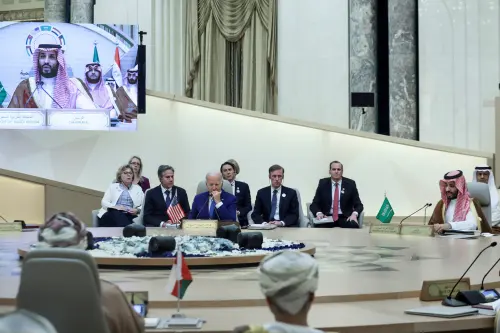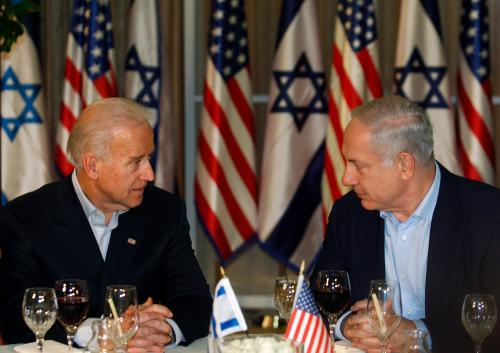Content from the Brookings Doha Center is now archived. In September 2021, after 14 years of impactful partnership, Brookings and the Brookings Doha Center announced that they were ending their affiliation. The Brookings Doha Center is now the Middle East Council on Global Affairs, a separate public policy institution based in Qatar.
Sultan Qaboos dies, new Omani ruler assumes power
Oman’s Sultan Qaboos, whose quiet diplomacy during five decades in power helped calm regional turbulence, died on January 10 at the age of 79. The new sultan, Haitham bin Tariq al-Said, assumed power the next day, promising to uphold the foreign policy of his Western-backed predecessor, under which Muscat balanced ties between larger neighbors Saudi Arabia and Iran as well as the United States.
World and regional leaders visited Oman’s new ruler at the royal palace in Muscat to offer condolences for the death of Sultan Qaboos. These leaders included the rulers of Qatar and the United Arab Emirates, as well as the foreign minister of Iran.
Qatar issues ministerial decree, amends penal code
Qatar abolished exit visa requirements for virtually all migrant workers on January 16, in a move the U.N. labor organization said was a “milestone” in reform efforts ahead of the 2022 FIFA World Cup. The ministerial decree allows nearly all migrant workers in Qatar to leave the country without first obtaining permission from their employers.
Qatar also published an addition to its penal code on January 19, criminalizing the publication of “false or biased” statements. Rights group Amnesty International said that the new law could “significantly restrict freedom of expression.” It allows for imprisonment of up to five years and a fine of up to 100,000 Qatari riyals ($27,000) for broadcasting, publishing, or republishing “false or biased rumors, statements or news, or inflammatory propaganda, domestically or abroad, with the intent to harm national interests, stir up public opinion, or infringe on the social system or the public system of the state.”
Saudi Arabia denies involvement in Bezos phone hacking
Saudi Arabia’s Foreign Minister Prince Faisal bin Farhan Al Saud said on January 22 that an allegation Crown Prince Mohammed bin Salman had been involved in a plot to hack the phone of Amazon founder Jeff Bezos was “absurd.” U.N. experts demanded that same day an immediate investigation by U.S. authorities and others into allegations that the crown prince was involved in a plot to hack Bezos’ phone.
The U.N. special rapporteurs, Agnes Callamard and David Kaye, said they had information pointing to the “possible involvement” of the crown prince in the alleged 2018 cyberattack, which preceded alleged threats by the National Enquirer to publish intimate photographs of the billionaire tech tycoon.
Fighting escalates in Yemen, Houthis attack Saudi targets
A drastic escalation in fighting between the Saudi-led military coalition and Houthi rebels in Yemen has killed and wounded hundreds of people, officials and tribal leaders said January 27. The U.S.-backed Arab coalition battling to restore Yemen’s internationally recognized government stepped up airstrikes on rebel targets northeast of the capital, Sanaa, following a monthslong lull, while Houthis shelled government-held areas.
Separately, Yemen’s Houthi military spokesman said on January 31 that the group had launched 26 rocket attacks that week against airports in southern Saudi Arabia, facilities belonging to oil giant Saudi Aramco and “two sensitive targets deep in” the kingdom. The spokesman for the Iran-aligned group, Yahya Sarea, said the attacks were in response to air strikes carried out inside Yemen by the Saudi-led coalition.
Saudi Arabia says Israelis not welcome to visit
Saudi Arabia’s foreign minister said Israelis were not welcome to visit the kingdom after Israel decreed that Israeli citizens could visit Saudi Arabia under certain circumstances, CNN reported on January 27. A statement from Israel’s interior minister had said that Israelis—if invited and permitted by Saudi authorities—would be allowed to travel there for religious reasons on pilgrimage or for up to nine days for business reasons, such as investment or meetings.
Qatari emir appoints new prime minister
Qatar’s ruler has appointed a new prime minister, the office of Emir Sheikh Tamim bin Hamad Al Thani said on January 28. Sheikh Khalid bin Khalifa bin Abdelaziz Al Thani will take on the role of prime minister after Sheikh Abdullah bin Nasser Al Thani, who was also Qatar’s interior minister, submitted his resignation to the emir. The new premier, aged around 51, who will also take on the post of interior minister, had been the head of the Amiri Diwan, the emir’s office.
Gulf countries respond to Trump peace plan
Several Gulf states issued responses to the Middle East peace plan that was announced by U.S. President Donald Trump on January 28, which proposed creating a Palestinian state and allowing Israel to maintain control of long-contested West Bank settlements.
The Qatari foreign ministry said that they appreciate the American efforts to find solutions to the Arab-Israeli conflict as long as they are within the framework of international legitimacy, adding that peace cannot be achieved without safeguarding the rights of Palestinians by establishing a sovereign state on the 1967 borders. Saudi Arabia reaffirmed its support for all efforts to achieve a just and comprehensive solution to the Palestinian issue, according to a statement by the foreign ministry, adding that it encourages starting direct peace negotiations between Palestine and Israel under U.S. auspices.
The Emirati ambassador to Washington said in a statement that the UAE believes Palestinians and Israelis can achieve lasting peace and genuine coexistence with the support of the international community, adding that the peace plan offers an important starting point for a return to negotiations within a U.S.-led international framework. Kuwait’s foreign ministry said that it “highly appreciates” U.S. efforts to end the Arab-Israeli conflict, reiterating its commitment to an independent Palestinian state based on its borders before the Israeli occupation of the West Bank.


Commentary
GCC News Roundup: New Omani ruler assumes power, Qatar Emir appoints new prime minister (January 1-31)
February 5, 2020